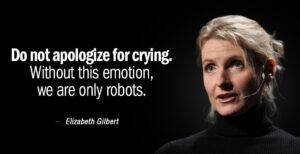《自律養生實踐家之旅364》 哭是療癒

你哭嗎?
這不是奇怪的問題,因為我確實見過不哭的人:我的父親。我第一次見到他的眼淚,是在他辭世的前一天。
你會哭嗎?你常哭嗎?
你一定看過那種「哭點很低」的人,眼淚說來就來,沒有預告,沒有掩飾,自然而然。
年輕時,我常對朋友說:「我最怕女人哭。」因為我對女人的眼淚毫無招架之力。特別是當我的妻子哭時,我彷彿瞬間變成一塊木頭,只能呆站著,什麼也做不了。
我不是要強調「一哭、二鬧、三上吊」的戲劇橋段,而是那種真正因委屈、悲傷而需要釋放的情感。
當我們談起親人所承受的苦痛,想到「子欲養而親不在」,甚至還沒聽見聲音,就先看見臉部扭曲、淚水奪眶而出。
我幾乎活了大半輩子才真正懂得「哭」。不是學會如何哭,而是領悟到哭的軌跡,那是一種靈魂深處的記憶被傳遞到眼淚出口的現象。
哭,是靈魂之窗打開的時刻。
電影院常上演「賣哭」的電影,散場時,看到觀眾紅著眼眶走出來,他們的淚水是被劇情牽動,是靈性仍停留在故事裡的回音。
我們用眼睛看電影,用大腦理解劇情,但真正讓我們淚流不止的,是靈性被觸動。大腦只是翻譯,靈性才是轉化故事的核心。
那麼,靈性為何是感動的泉源?它想傳遞什麼訊息?它是否懷抱著大腦一時無法詮釋的深意?
問問自己:哭過之後,是覺得舒暢,還是更難過?像大笑之後情緒會趨於平穩,哭過之後的心情,是釋放還是激盪?
也許,這些問題該讓「感動」來回答。
一首歌可以讓全場淚流,一場演說可以讓人哽咽不已。
為何人會被感動?為何每個人的感動點都不同?或許,這些答案,必須由靈性親自揭示。
我喜歡聖歌的旋律和意境,基督教的福音演唱會,令人動容的不只是音樂,還有會眾全然投入的心。
不論任何宗教或修行的聚會,人們相聚都是為了靈性的依歸。迷路已久的自己,多麼渴望可以早日回家。
我曾在修行場域中見證靈性渴望回家的哭泣,也曾在佛曲中多次落淚。那一刻領悟到:眼淚是心的語言,不是腦的指令。
即便是生活中最尋常的片刻,眼淚仍提醒我們:生命的本質已經歷過它該經歷的一切,靈性厭倦了漂泊,只想回家。
無論是委屈而哭、憤怒而哭、被傷害而哭、被背叛而哭,都是靈魂的記錄,是它非常熟悉的痛。
嬰兒的哭聲,真的是因為肚子餓嗎?或許,那是他能表達意見的唯一方式;或許,他剛來到人世,突然忘了自己為何前來;或許,那是他在軀殼之內唯一能表達情緒的語言。
我不是心理師,卻常在工作中扮演療癒者的角色。那些埋藏許久的傷痛,需要勇敢說出,也需要用哭來宣洩。
哭,不一定代表徹底釋放。有些人需要哭好幾次,深刻的記憶才會慢慢鬆動。否則,它們會轉化成身體的重症,成為醫學無法解釋的病。
在第一線輔導淨化時,我見證了真正的心理排毒,也更明白:必須讓身體帶路,才能接觸「內在的聲音」。
這個聲音,其實我們早已熟悉,只是太久沒有傾聽。
柯維在《第八種習慣》中提到「找到自己內在的聲音」,他的理解和說明是如此貼近、真實、誠懇。
如果我說,人會生病,是因為對自己不誠實,你會相信嗎?
身體記錄了每一次耗損,靈性記錄了每一次欺瞞。生命的真相,不在大腦的記憶,而在眼淚的濕潤。
「自己騙自己」這個詞你一定聽過,是哪個自己不誠實?是哪個自己一直真誠守護事實?
眼淚和哭聲,是引領我們回到真實自我的入口。那個自己,也許能寫出「養生大全」,也許能揭露「生命真相」。那個自己,是我們失落已久、等待重逢的自己。
哭吧!哭是最真實的語言,是最不需掩飾的情緒。
只有身體知道,那是一場身心相連的療癒;只有靈性知道,那是穿越世代的記憶。
(不要因為哭泣而道歉,少了這種情緒表達,我們只是機器人。)
Crying as Healing
Do you cry?
This isn’t a strange question, because I have indeed seen people who don’t cry—my father was one of them. The first and only time I saw his tears was the day before he passed away.
Do you cry? Do you cry often?
Surely, you’ve met those “low crying threshold” people, whose tears come without warning or disguise—purely, naturally.
When I was younger, I often told my friends, “The thing I fear most is seeing a woman cry.” I was defenseless before a woman’s tears. Whenever my wife cried, I would instantly turn into a block of wood—frozen, unable to do anything.
I am not talking about the dramatic cliché of “cry, make a scene, threaten to die.” I mean those tears born from real grievance or sorrow, the kind that must be released.
When we speak of the suffering of loved ones, when we think of that aching line “a child longs to care for his parents, but they are no longer there,” sometimes before hearing a word, we first see the face twist, and tears break free.
It took me nearly half a lifetime to truly understand “crying.” Not to learn how to cry, but to recognize its path—a phenomenon where a memory deep within the soul is carried all the way to the eyes and released as tears.
Crying is the moment the window of the soul opens.
In the cinema, there are always films designed to “sell tears.” At the end of such a movie, when you see audiences step out with reddened eyes, those tears are echoes—evidence that their spirit still lingers within the story.
We watch a film with our eyes, we understand it with our mind, but what makes tears unstoppable is that the spirit has been touched. The mind is merely the translator; the spirit is the true interpreter, the one transforming story into meaning.
So why is the spirit the source of our being moved?
What message does it want to send?
Does it carry depths the mind cannot immediately translate?
Ask yourself: after crying, do you feel lighter or heavier?
Like laughter that brings emotional equilibrium, do tears bring release—or do they stir the heart into greater unrest?
Perhaps such questions are best answered by “being moved.”
A single song can make an entire room weep.
A speech can choke its audience into silence.
Why do we cry? Why are our tears triggered by different things?
Perhaps these answers must be revealed by the spirit itself.
I love the sound and atmosphere of sacred music. At Christian gospel concerts, it is not only the music that moves me, but also the sight of an audience fully surrendering their hearts.
Regardless of religion or spiritual tradition, people gather because they long for the same thing: a homecoming for the soul.
A self that has been wandering too long yearns to go home.
I have witnessed tears of homecoming in places of spiritual practice, and I have wept many times to Buddhist chants.
In those moments, I realized: tears are the language of the heart, not commands of the brain.
Even in the most ordinary moments of daily life, tears remind us that life has gone through what it needed to go through, and the soul, weary of drifting, longs to return home.
Whether we cry from grievance, anger, hurt, or betrayal—those tears are the soul’s record, a pain it knows by heart.
Is a baby’s cry only about hunger?
Perhaps it is simply their only way to speak.
Perhaps, having just arrived on earth, they have forgotten why they came.
Perhaps it is the only language they have to express emotion within such a tiny body.
I am not a therapist, yet I often play the role of healer in my work.
Old wounds buried for years must be given voice—and tears are part of their release.
Crying does not always mean complete release.
Some memories must be wept through several times before they loosen their grip.
If not, they harden into illness, the kind medicine cannot fully explain.
In the frontline of guiding people through cleansing programs, I have seen true psychological detoxification—and I have understood more deeply that the body must lead the way to reach the “inner voice.”
This voice is not a stranger—we have always known it, we’ve simply stopped listening for too long.
Stephen Covey, in The 8th Habit, spoke about “finding your voice,” and his explanation is so close, so real, so sincere.
If I told you that illness arises when we are dishonest with ourselves, would you believe me?
The body keeps record of every depletion; the soul keeps record of every deception.
The truth of life is not stored in the brain’s memory, but in the wetness of our tears.
You’ve heard the phrase “lying to yourself.”
Which self is being dishonest?
And which self is faithfully guarding the truth?
Tears and crying are gateways back to the real self—the one that might write the great “Book of Health,” the one that might reveal “the truth of life.”
That self is the one we lost long ago, and the one we have been waiting to meet again.
So cry.
Crying is the most authentic language, the emotion that needs no disguise.
Only the body knows that this is a healing that unites body and mind.
Only the spirit knows that these are memories crossing generations.


